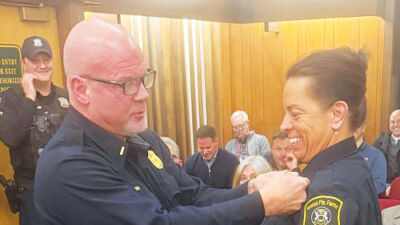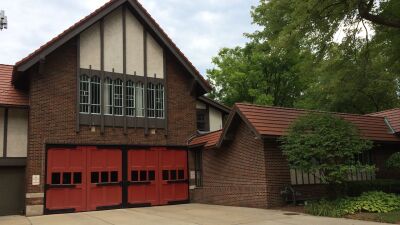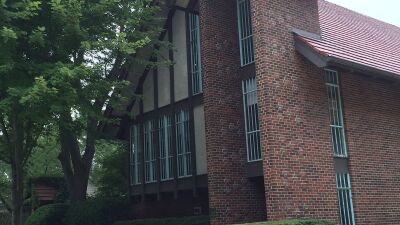GROSSE POINTES/HARPER WOODS — A relatively new nonprofit is hoping to bring license plate readers and surveillance cameras to the five Grosse Pointes and Harper Woods as a way to reduce and deter crime.
Recognizing that municipal budgets are tight and new public safety technology is costly, the nonprofit Grosse Pointe Public Safety Foundation was launched in April 2023 as a way to raise funds for new technology for the public safety departments in the five Grosse Pointes and Harper Woods.
GPPSF Executive Director Daniel Jensen has been addressing officials in the six cities over the last several months. Jensen, who retired as Grosse Pointe Farms’ public safety director in 2021, said the project they’re exploring now is a system of license plate readers and cameras at key intersections in the six cities.
Jensen said they’re considering using Flock cameras. Flock Safety License Plate Recognition cameras are used in Detroit and a number of other metro Detroit communities. Because the Flock system is integrated, police can follow, for example, the path of a stolen vehicle as it moves from one city into another, as long as both cities have these cameras.
A spokesperson for Flock explained by email that municipalities need to sign a memorandum of understanding allowing another community to access their license plate reader data. An AMBER Alert, however, is automatically uploaded across the Flock system.
Jensen said the cameras take a picture of each license plate as the vehicle goes by and runs it through law enforcement systems to see if the vehicle is stolen or has otherwise been flagged, as might be the case if, for example, a kidnapping victim was believed to be in said vehicle. If police are looking for a particular vehicle believed to have been used in a crime, such as a blue pickup truck, Jensen said officers who are authorized to use the Flock system can input that vehicle information and the computer will only pull up vehicles that match a particular description, quickly narrowing down a vehicle search.
Jensen pointed out that these cameras focus on license plates, so they aren’t targeting motorists based on their race or ethnicity.
The cameras have also been used to find seniors with dementia after they’ve driven somewhere and gotten lost.
“It has to add to the safety of the community,” Jensen said. “This technology is really good.”
Flock is used by approximately 110 law enforcement agencies in Michigan — including the police departments in Troy, Fraser, Sterling Heights, Farmington Hills, Taylor and Allen Park — and more than 5,000 law enforcement agencies nationwide. Michigan State Police have used Flock on freeways.
“We’ve used it in probably 90% of the freeway shootings that have occurred, and we have an arrest in all of them,” Lt. Michael Shaw, of the Michigan State Police, said in a press release from Flock.
In other cities where these camera systems have been installed, crime has dropped, more arrests have been made, and missing adults and children have been found and returned home, Jensen said.
“Where these have been used, crime has been reduced 17% to 70%,” Jensen said.
The foundation’s first project was the installation of two repeaters at Grosse Pointe South High School, which Jensen said was completed in September 2023. The roughly $230,000 project allows for reliable radio and cellphone communication inside the historical school building.
Prior to the installation of the repeaters, Jensen said officers entering the building wouldn’t be able to communicate via radio with anyone outside the building, because the thick walls prevented the signal from travelling. Likewise, cellphone coverage in South was spotty at best. The danger was that in the event of an active shooter or other emergency, officers in the school wouldn’t be able to relay what was happening to anyone on the outside.
Jensen said the foundation focuses on which purchases will meet the greatest needs of the departments.
“We are not budget fillers,” Jensen said. “We are basically a technology-based foundation. … All of our projects are going to be technology-based.”
Grosse Pointe Park already had its own nonprofit, the Grosse Pointe Park Public Safety Foundation, which was formed in the summer of 2022.
“We’re not here to compete (with that foundation), but to assist with,” Jensen told the Park City Council Jan. 8. “All of this is us together as a team.”
Park Mayor Michele Hodges said that several Park residents are on the GPPSF Board.
“We’re so grateful for the partnership,” Hodges said. “Partnerships matter. We can’t get it done without partners.”
Officials in other cities greeted news of the foundation enthusiastically as well.
“That’s exciting,” Grosse Pointe City Councilman Christopher Walsh said at a Dec. 18 council meeting. “We haven’t had that kind of community support for a public safety effort (before). … I think that’s encouraging for the entire community.”
City Mayor Sheila Tomkowiak agreed, saying it was great to have the foundation.
Jensen said the foundation hopes to raise $450,000 for a camera system. That would include the price to lease and maintain the system for about two to three years, he said.
“It doesn’t change any department’s policies,” Jensen said of the cameras. He said each city would need to establish its own policies and guidelines regarding who can access the camera system and how it can be used, so that the system isn’t abused.
Leaders in each city would determine where cameras should go within their boundaries.
In April, Jensen said, he expects to meet with the city managers of the Grosse Pointes and Harper Woods, along with representatives from Flock and other camera system providers.
Jensen had initially hoped the cities could have a camera system installed by June, but it now appears that installation won’t happen until later, assuming all the cities agree to it. He said if they opt for Flock, Flock representatives would secure any needed permits to install cameras on existing light or utility poles.
Jensen said the foundation’s website — gppsf.org — just went live at the end of February. People can visit the website to make donations, or they can stop by the foundation’s office at 63 Kercheval Ave. in Grosse Pointe Farms.
Jensen said additional fundraisers are expected to be held in the coming months, but nothing had been scheduled at press time. The GPPSF’s first fundraiser last year was a golf outing.
 Publication select ▼
Publication select ▼

























